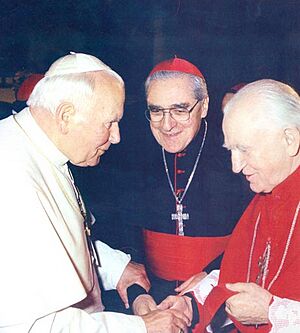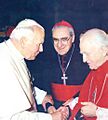Jean-Marie Lustiger facts for kids
Quick facts for kids His Eminence Aron Jean-Marie Lustiger |
|
|---|---|
| Cardinal, Archbishop emeritus of Paris | |

Lustiger outside Notre Dame Cathedral, 15 August 1988
|
|
| See | Paris |
| Enthroned | 31 January 1981 |
| Reign ended | 11 February 2005 (retired) |
| Predecessor | François Marty |
| Successor | André Vingt-Trois |
| Other posts | Bishop of Orléans (1979-1981) |
| Orders | |
| Ordination | 17 April 1954 |
| Consecration | 8 December 1979 by Cardinal François Marty |
| Created Cardinal | 2 February 1983 |
| Personal details | |
| Birth name | Aron Lustiger |
| Born | 17 September 1926 Paris, France |
| Died | 5 August 2007 (aged 80) Paris, France |
| Buried | Cathedral of Notre Dame de Paris, Paris, France |
| Denomination | Roman Catholic |
| Parents | Charles and Gisèle Lustiger |
Aron Jean-Marie Lustiger (17 September 1926 – 5 August 2007) was an important French cardinal in the Catholic Church. He served as the Archbishop of Paris from 1981 until he retired in 2005. Pope John Paul II made him a cardinal in 1983. His life story was even made into a film in 2013 called Le métis de Dieu (The Jewish Cardinal).
Contents
Life Story
Growing Up
Aron Lustiger was born in Paris, France. His parents, Charles and Gisèle Lustiger, were Ashkenazi Jews from Poland. They had moved from Poland around the time of World War I. Aron's father owned a hosiery shop.
When Aron was about 10 to 12 years old, he found a Protestant Bible. He felt a strong connection to it. When World War II started in September 1939, his family moved to Orléans.
In March 1940, when he was 13, Aron decided to become a Catholic. He was baptized as Aron Jean-Marie by the Bishop of Orléans. His sister later also converted. In October 1940, new laws were passed that made life very difficult for Jewish people.
Aron, his father, and sister went to southern France to be safe. His mother stayed in Paris to manage the family business. Sadly, in September 1942, his mother was sent to the Auschwitz concentration camp. She died there the next year. After the war, the family returned to Paris. Aron's father tried to cancel his son's baptism, but he was not successful.
Becoming a Priest
Lustiger studied at the Sorbonne and earned a degree in literature in 1946. He then went to a seminary to train as a priest. He visited Israel for the first time in 1951. On 17 April 1954, he became a priest. From 1954 to 1959, he worked as a chaplain at the Sorbonne.
For the next ten years, he directed the Richelieu Centre. This center trained chaplains for universities and helped students.
From 1969 to 1979, Lustiger was a vicar at a church in a wealthy part of Paris. His assistant, André Vingt-Trois, later became Archbishop of Paris after him.
On 10 November 1979, Pope John Paul II chose Lustiger to be the Bishop of Orléans. He became a bishop on 8 December 1979.
Archbishop of Paris
On 31 January 1981, Lustiger became the Archbishop of Paris. He took over from Cardinal Marty. Some people were surprised by his appointment.
Lustiger was known for being a great communicator. He was very interested in the media. He helped create Catholic radio and television channels, like Radio Notre-Dame. He also started KTO TV in 1999. He also opened a new seminary to train priests.
Some people thought he was very strict, and they called him "Bulldozer." He made many changes in the Archdiocese of Paris. In February 1983, Pope John Paul II made him a Cardinal-Priest. As a cardinal, Lustiger became known around the world. Some even thought he might be chosen as the next pope.
Cardinal Lustiger made several changes in Paris. He created a new theology school in 1984. He also built seven new churches in Paris. He supported new religious groups, like the Emmanuel Community. He ordained 200 priests in Paris during his time.
In 1984, Lustiger led a large protest against a law that would reduce money for private schools, which were mostly Catholic. This protest was successful. He also spoke out against a 2004 law that limited religious symbols in schools.
Lustiger had good relationships with politicians, even those he disagreed with. He was elected to the Académie française in 1995. Two years later, he organized a World Youth Day in Paris. Over a million people attended this event.
His Beliefs
Lustiger strongly supported the Pope's authority in religious matters. He believed that priests should not marry. He also did not support the idea of women becoming priests. He started a group called Tibériade to help people with AIDS.
He believed that Christianity was the fulfillment of Judaism. He saw the New Testament as a natural continuation of the Old Testament. He said that modern anti-Semitism came from the Enlightenment.
Lustiger was a strong opponent of racism and anti-Semitism. He criticized Jean-Marie Le Pen, a French politician, comparing his views to Nazism. He said, "The Christian faith says that all men are equal in dignity because they are all created in the image of God."
He also disagreed with the idea of making Queen Isabella I of Castile a saint. He opposed this because Isabella had expelled Jews from her lands in 1492.
His Jewish Heritage
Lustiger was one of the few Catholic leaders who were born Jewish and still considered themselves "Jewish" throughout their lives. He said he was proud of his Jewish background. He called himself a "fulfilled Jew," which caused some debate among both Christians and Jews. Some Jewish leaders criticized him for converting. However, Lustiger believed that being "Jewish" was about his family and culture, not just religion.
He said: "I was born Jewish and so I remain, even if that is unacceptable for many. For me, the vocation of Israel is bringing light to the goyim. That is my hope and I believe that Christianity is the means for achieving it."
A former chief rabbi of France, Rabbi René Samuel Sirat, said he saw Lustiger go into a synagogue to say a special prayer for his mother.
Cardinal Lustiger helped negotiate the removal of Carmelite nuns who had built a convent near the Auschwitz concentration camp in 1987. He also represented Pope John Paul II at the 60th anniversary of the liberation of Auschwitz in 2005.
In 1995, Cardinal Lustiger attended a ceremony where Catholic leaders apologized for the French Church's actions during World War II.
In 1998, he received an award for helping improve relations between Catholics and Jews. However, some Jewish groups protested this award because he had converted from Judaism. In France, though, Lustiger had good relationships with the Jewish community.
Retirement and Death
When Lustiger turned 75 in 2001, he offered his resignation as Archbishop of Paris to Pope John Paul II. The Pope accepted it on 11 February 2005. André Vingt-Trois became the new Archbishop of Paris.
Lustiger made his last public appearance in January 2007. He passed away on 5 August 2007, after battling bone and lung cancer. His funeral was held at Notre Dame Cathedral on 10 August 2007. As a tribute to his Jewish heritage, a Jewish prayer called the Kaddish was recited by his cousin at the cathedral.
Lustiger wrote his own epitaph (words on his tombstone) in 2004. It can be found in the crypt of Notre-Dame Cathedral. It says:
I was born Jewish.
I received the name
Of my paternal grandfather, Aron.
Having become Christian
By faith and by Baptism,
I have remained Jewish
As did the Apostles.
I have as my patron saints
Aron the High Priest,
Saint John the Apostle,
Holy Mary full of grace.
Named 139th archbishop of Paris
by His Holiness Pope John Paul II,
I was enthroned in this Cathedral
on 27 February 1981,
And here I exercised my entire ministry.
Passers-by, pray for me.
† Aron Jean-Marie Cardinal Lustiger
Archbishop of Paris
Images for kids
 | Calvin Brent |
 | Walter T. Bailey |
 | Martha Cassell Thompson |
 | Alberta Jeannette Cassell |




